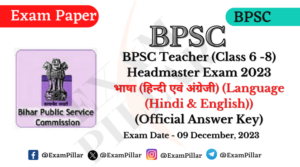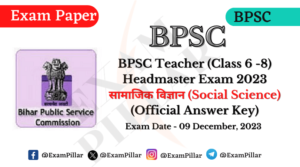बिहार लोक सेवा आयोग (BPSC – Bihar Public Service Commission) के द्वारा आयोजित की गई बिहार शिक्षा भर्ती का आयोजन 08 दिसम्बर 2023 को प्रथम पाली में किया गया था। यह परीक्षा BPSC TER (Teachers Recruitment Exam) (Class 9-10) के अंगेजी (English) विषय के लिए कराया गया था। इस परीक्षा का प्रश्नपत्र उत्तर कुंजी सहित (Exam Paper With Official Answer Key) यहाँ उपलब्ध है –
Bihar Public Service Commission (BPSC) has Conduct the BPSC TER (Teachers Recruitment Exam) (Class 9-10) English Exam 2023 held on 08 December, 2023 (First Shift). This BPSC Teacher (Class 9-10) Exam Paper available here with official Answer Key.
| परीक्षा | BPSC TRE (Class 9-10) Exam 2023 |
| विषय | English |
| परीक्षा तिथि |
08 December, 2023 (Ist Shift) |
| कुल प्रश्न | 80 |
| पेपर सेट | A |
BPSC School Teacher (Class 9 – 10) Examination 2023
ENGLISH
(Official Answer Key)
Click Here to BPSC School Teacher Exam (Class 9 – 10) Q-01 – Q-70
PART – III (ENGLISH)
Directions (Q. Nos. 71 to 85): Choose the correct alternative.
71. Who wrote the Amoretti sonnet sequence?
(A) John Lyly
(B) Robert Burns
(C) Edmund Blunden
(D) More than one of the above
(E) None of the above
Show Answer/Hide
72. Which of the following plays was not written by Shakespeare?
(A) The Winter’s Tale
(B) Tamburlaine
(C) The Jew of Malta
(D) More than one of the above
(E) None of the above
Show Answer/Hide
73. Who termed the novel ‘a new province of writing’ that was ‘a comic epic-poem in prose’?
(A) Joseph Addison
(B) Henry James
(C) Robert Bunyan
(D) More than one of the above
(E) None of the above
Show Answer/Hide
74. Which of the following novels is an example of the use of the Gothic mode of writing?
(A) Joseph Andrews
(B) Tristram Shandy
(C) The Castle of Otranto
(D) More than one of the above
(E) None of the above
Show Answer/Hide
75. Who among the following the Romantic poets defined poetic faith as being constituted by ‘the willing suspension of disbelief’?
(A) William Wordsworth
(B) S. T. Coleridge
(C) P. B. Shelley
(D) More than one of the above
(E) None of the above
Show Answer/Hide
76. Who among the following poets wrote about ‘innocence’ and ‘experience’ as being the ‘two contrary states of the human soul’?
(A) Robert Burns
(B) William Blake
(C) John Clare
(D) More than one of the above
(E) None of the above
Show Answer/Hide
77. In which famous novel do we find the character of Heathcliff?
(A) Wuthering Heights
(B) The Mayor of Casterbridge
(C) Ivanhoe
(D) More than one of the above
(E) None of the above
Show Answer/Hide
78. Who wrote the groundbreaking work on human evolution titled On the Origin of Species?
(A) Lord Alfred Tennyson
(B) Charles Darwin
(C) John Lyell
(D) More than one of the above
(E) None of the above
Show Answer/Hide
79. Which modern poet wrote the line, “Things fall apart; the centre cannot hold”?
(A) T. S. Eliot
(B) William Spender
(C) W. H. Auden
(D) More than one of the above
(E) None of the above
Show Answer/Hide
80. Who used the term ‘objective correlative’ in the essay titled Hamlet and His Problems ?
(A) Virginia Woolf
(B) Aldous Huxley
(C) T. S. Eliot
(D) More than one of the above
(E) None of the above
Show Answer/Hide
81. Which novelist created the fictional town of Malgudi?
(A) Raja Rao
(B) Mulk Raj Anand
(C) R. K. Narayan
(D) More than one of the above
(E) None of the above
Show Answer/Hide
82. Which famous Indian litterateur wrote the novel, The Home and the World?
(A) Premchand
(B) Rabindranath Tagore
(C) Raja Rao
(D) More than one of the above
(E) None of the above
Show Answer/Hide
83. Who wrote the novel, 1984 ?
(A) George Orwell
(B) Robert Ludlum dystopian
(C) Ernest Hemingway
(D) More than one of the above
(E) None of the above
Show Answer/Hide
84. Which British dramatist created the character of Jimmy Porter in Look Back in Anger?
(A) Harold Pinter
(B) John Osborne
(C) Kingsley Amis
(D) More than one of the above
(E) None of the above
Show Answer/Hide
85. In which Shakespearean play do we find the character of Banquo?
(A) Hamlet
(B) Othello
(C) King Lear
(D) More than one of the above
(E) None of the above
Show Answer/Hide
Directions (Q. Nos. 86 to 110): Read the passages given below and answer the questions that follow. :
Passage – 1
As the New Year approached, like many others, I found myself making resolutions in my mind. The usual suspects made their appearance waking up earlier, eating healthier, spending more time with loved ones, tackling household chores, being kinder to those I don’t particularly like, driving cautiously, and taking the dog for a daily walk. But this time, I was determined to make my resolutions unique and achievable, learning from past failures.
I realized that one of the reasons why most of us fail in our efforts to self-improve is because our goals are often too ambitious, and we struggle to find time to follow through with them. So, I decided to keep my resolution to myself, limiting them to just two modest ambitions: exercising every morning and reading more every evening.
The first resolution was to exercise for just eleven minutes every morning before anyone else in my household was awake. The challenge was real, as dragging myself out of bed eleven minutes earlier than usual required significant self-discipline. But for the first two days, I managed to sneak down to the living room and jump around on the carpet without being caught. However, my cover was blown when my exhausted state after the exercise gave me away at the breakfast table. Soon, my family caught on and my morning exercise routine became a subject of amusements for them. Despite their teasing, I tried to stick to it, but gradually, my enthusiasm waned, and I found myself back to square one by January 10th, giving up on the morning exercise routine. Undeterred by my failure in the first resolution, I focused on my second resolution to read more every evening. I resisted the allure of television and spent a few evenings with my eyes glued to a book in my room. However, one cold and lonely night, I succumbed to the temptation of television and pretended to read while dozing off in front of the screen. It became a habit again, and I realized I had fallen back into my old ways.
Despite these setbacks, I refused to give up on my resolution to read more. In fact, I took a bold step and bought a book titled How to Read a Thousand Words a Minute. However, the irony was not lost on me that I hadn’t found the time to read it yet, showcasing the challenges I faced in keeping up with my resolutions.
86. What was the author’s first resolution for the New Year?
(A) Exercising every morning for eleven minutes
(B) Reading more every evening
(C) Eating healthier
(D) More than one of the above
(E) None of the above
Show Answer/Hide
87. What did the author do to resist the temptation of television and read more every evening?
(A) Watched television while pretending to read
(B) Sat in his room with his eyes glued to a book
(C) Ignored television and went for a walk
(D) More than one of the above
(E) None of the above
Show Answer/Hide
88. What did the author do one night when feeling cold and lonely?
(A) Continued reading in his room
(B) Went for a walk
(C) Watched television and pretended to read
(D) More than one of the above
(E) None of the above
Show Answer/Hide
89. What did the author buy to help himself with his resolution to read more?
(A) A book titled How to Read a Thousand Words a Minute
(B) A new television
(C) A subscription to a book club
(D) More than one of the above
(E) None of the above
Show Answer/Hide
90. Why did the author find it ironic that he bought a book but had not read it yet?
(A) Because he did not have time to read it
(B) Because the book was too difficult to understand
(C) Because he lost interest in reading
(D) More than one of the above
(E) None of the above
Show Answer/Hide
91. What was the author’s approach to making resolutions this year?
(A) Keeping resolutions a secret
(B) Not making any resolutions
(C) Making unique and achievable resolutions
(D) More than one of the above
(E) None of the above
Show Answer/Hide
92. What does the term ‘resisted the allure’ used in the passage mean?
(A) Gave in to temptation
(B) Fought back against the attraction
(C) Do nothing something about
(D) More than one of the above
(E) None of the above
Show Answer/Hide
93. What were the usual suspects in the author’s list of New Year resolutions?
(A) Waking up earlier, eating healthier, spending more time with loved ones
(B) Tackling household chores, being kinder to those not liked, driving cautiously
(C) Taking the dog for a daily walk
(D) More than one of the above
(E) None of the above
Show Answer/Hide
94. Which one of the following words means the opposite of ‘cautiously’?
(A) Carefully
(B) Recklessly
(C) Diligently
(D) More than one of the above
(E) None of the above
Show Answer/Hide




